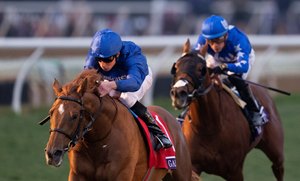Communication Key to Avoid BC Gate Scratch Repeat


A Breeders' Cup and Kentucky Horse Racing Commission official emphasized communication between the Kentucky stewards and the veterinary team working the Breeders' Cup as a key to potentially avoiding an erroneous scratch during the Nov. 4-5 event, like one that occurred in 2021 at Del Mar.
Last year in California, the Breeders' Cup Juvenile Turf (G1T) was marred by a veterinarian's premature recommendation to scratch Godolphin's Modern Games , the 9-5 favorite at the time, after his Charlie Appleby-trained stablemate, Albahr , reared and became entangled beneath the starting gate. The two horses were alongside each other.
Albahr ultimately was scratched, and Modern Games, uninjured, was allowed through the front of the gate when it was opened by the gate crew. The report stated that "veterinarians on scene initially believed that Modern Games had forced his way through the starting gate, and they made the decision to scratch him."
When informed by gate personnel that Modern Games did not force the gate doors open, veterinarians inspected him and advised the stewards that Modern Games was fit to compete. Re-inserted into the race minutes later after it was determined the horse had not broken through the gate, he raced for purse money only and was victorious. Because of that purse-only status, bettors that wagered on him collected no winnings.
This affected millions of dollars in the betting pools. Wagers like win, place, and show were refunded and wagers like the Double, Pick 3, Pick 4, Pick 5, and Pick 6 that had Modern Games in the Juvenile Turf were not considered fully winning tickets. (Consolations were paid on double and Pick 3 wagers.)
Tiz the Bomb , second across the wire, paid off for first for wagering purposes, paying $17.60 to win.
Track veterinarian Dr. Dana Stead, normally responsible for calling the stewards, did not contact them. Rather, another veterinarian, Dr. Chuck Jenkins, did, according to the California Horse Racing Board executive director Scott Chaney.
Chaney said at the time, "To be fair, there are a lot of cooks in the kitchen right now," a reference to the large staff of veterinarians brought onsite as part of the Breeders' Cup veterinary team. The CHRB did not issue any penalties or sanctions toward those involved.
The high number of veterinarians that work the Breeders' Cup provides increased opportunity for multiple pre-race inspections and collaboration related to equine health. Officials said there are 20 vets overseeing this year's event at Keeneland.
Asked about takeaways his organization gleaned from the incident, Breeders' Cup president and CEO Drew Fleming mentioned findings from a California Horse Racing Board report issued in March.
"We also have a close relationship with the (Kentucky Horse Racing Commission), and work to continue to make sure we have great communication," he said of this year's event.
The CHRB report issued five recommendations, which touched upon tote and pari-mutuel improvements and the designation of one racing veterinarian to be "the only person who can recommend a scratch to the stewards."
KHRC equine medical director Dr. Bruce Howard said only one veterinarian is responsible in Kentucky for that communication.
"Dr. Nick Smith, our chief vet, will be at the starting gate for all of the starts," Howard said. "We've operated under this rule as long as we've been doing this, and so all horses will be examined if they move through the front of the gate. If it's determined they're OK to race they'll be allowed to go back in. If there is going to be a scratch he communicates with the stewards, but he will be the only person talking to the stewards from the starting gate."
